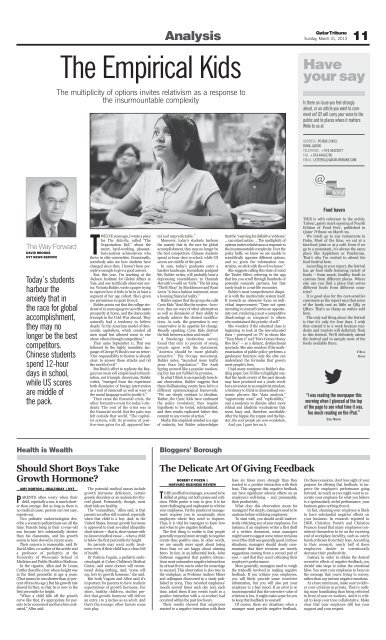Karzai hopeful of Taliban joining mainstream - Qatar Tribune
Karzai hopeful of Taliban joining mainstream - Qatar Tribune
Karzai hopeful of Taliban joining mainstream - Qatar Tribune
You also want an ePaper? Increase the reach of your titles
YUMPU automatically turns print PDFs into web optimized ePapers that Google loves.
Analysis Sunday, March 31, 2013 11<br />
The Empirical Kids<br />
The multiplicity <strong>of</strong> options invites relativism as a response to<br />
the insurmountable complexity<br />
Have<br />
your say<br />
Is there an issue you feel strongly<br />
about, or an article you want to comment<br />
on? QT will carry your voice to the<br />
public and to places where it matters.<br />
Write to us at<br />
ADDRESS: PO BOX 23493,<br />
DOHA, QATAR<br />
TELEPHONE: +974.44422077<br />
FAX: +974.44416790<br />
EMAIL: LETTERS@QATAR-TRIBUNE.COM<br />
Food haven<br />
The Way Forward<br />
DAVID BROOKS<br />
NYT NEWS SERVICE<br />
Today’s students<br />
harbour the<br />
anxiety that in<br />
the race for global<br />
accomplishment,<br />
they may no<br />
longer be the best<br />
competitors.<br />
Chinese students<br />
spend 12-hour<br />
days in school,<br />
while US scores<br />
are middle <strong>of</strong><br />
the pack.<br />
TWELVE years ago, I wrote a piece<br />
for The Atlantic, called “The<br />
Organisation Kid,” about the<br />
smart, hard-working, pleasantbut-cautious<br />
achievatrons who<br />
thrive in elite universities. Occasionally,<br />
somebody asks me how students have<br />
changed since then. I haven’t been perceptive<br />
enough to give a good answer.<br />
But, this year, I’m teaching at the<br />
Jackson Institute for Global Affairs at<br />
Yale, and one terrifically observant senior,<br />
Victoria Buhler, wrote a paper trying<br />
to capture how it feels to be in at least a<br />
segment <strong>of</strong> her age cohort. She’s given<br />
me permission to quote from it.<br />
Buhler points out that the college students<br />
<strong>of</strong> 12 years ago grew up with 1990s<br />
prosperity at home, and the democratic<br />
triumph in the Cold War abroad. They<br />
naturally had a tendency to believe<br />
deeply “in the American model <strong>of</strong> democratic<br />
capitalism, which created all<br />
men equal but allowed some to rise<br />
above others through competition.”<br />
Then came September 11. That was<br />
followed by the highly moralistic language<br />
<strong>of</strong> George W Bush’s war on terror:<br />
“Our responsibility to history is already<br />
clear: to answer these attacks and rid<br />
the world <strong>of</strong> evil.”<br />
But Bush’s effort to replicate the Reagan<br />
war on an evil empire lead to humiliation,<br />
not triumph. Americans, Buhler<br />
writes, “emerged from the experience<br />
both dismissive <strong>of</strong> foreign intervention<br />
as a tool <strong>of</strong> statecraft as well as wary <strong>of</strong><br />
the moral language used to justify it.”<br />
Then came the financial crisis, the<br />
other formative event for today’s students.<br />
The root <strong>of</strong> the crisis was in<br />
the financial world. But the pain was<br />
felt outside that world. “The capitalist<br />
system, with its promise <strong>of</strong> positive-sum<br />
gains for all, appeared brutal<br />
and unpredictable.”<br />
Moreover, today’s students harbour<br />
the anxiety that in the race for global<br />
accomplishment, they may no longer be<br />
the best competitors. Chinese students<br />
spend 12-hour days in school, while US<br />
scores are middle <strong>of</strong> the pack.<br />
In sum, today’s graduates enter a<br />
harsher landscape. Immediate postgrad<br />
life, Buhler writes, will probably bear a<br />
depressing resemblance to Hannah<br />
Horvath’s world on “Girls.” The hit song<br />
“Thrift Shop” by Macklemore and Ryan<br />
Lewis “is less a fashion statement, more<br />
a looming financial reality.”<br />
Buhler argues that the group she calls<br />
Cynic Kids “don’t like the system – however,<br />
they are wary <strong>of</strong> other alternatives<br />
as well as dismissive <strong>of</strong> their ability to<br />
actually achieve the desired modifications.<br />
As such, the generation is very<br />
conservative in its appetite for change.<br />
Broadly speaking, Cynic Kids distrust<br />
the link between action and result.”<br />
A Brookings Institution survey<br />
found that only 10 percent <strong>of</strong> young<br />
people agree with the statement,<br />
“America should be more globally<br />
proactive.” The Occupy movement,<br />
Buhler notes, “launched more traffic<br />
jams than legislation.” The Arab<br />
Spring seemed like a popular awakening<br />
but has not fulfiled its promise.<br />
In what I think is an especially trenchant<br />
observation, Buhler suggests that<br />
these disillusioning events have led to a<br />
different epistemological framework.<br />
“We are deeply resistant to idealism.<br />
Rather, the Cynic Kids have embraced<br />
the policy revolution; they require<br />
hypothesis to be tested, substantiated,<br />
and then results replicated before they<br />
commit to any course <strong>of</strong> action.”<br />
Maybe this empirical mindset is a sign<br />
<strong>of</strong> maturity, but Buhler acknowledges<br />
that the “yearning for definitive ‘evidence’<br />
... can retard action. ... The multiplicity <strong>of</strong><br />
options invites relativism as a response to<br />
the insurmountable complexity. Ever the<br />
policy buffs, we know we are unable to<br />
scientifically appraise different options,<br />
and so, given the information constraints,<br />
we stick with the evil we know.”<br />
She suggests calling this state <strong>of</strong> mind<br />
the Tinder Effect, referring to the app<br />
that lets you scroll through hundreds <strong>of</strong><br />
potential romantic partners, but that<br />
rarely leads to a real-life encounter.<br />
Buhler’s most comprehensive disquiet<br />
is with the meritocratic system itself.<br />
It rewards an obsessive focus on individual<br />
improvement: “Time not spent<br />
investing in yourself carries an opportunity<br />
cost, rendering you at a competitive<br />
disadvantage as compared to others<br />
who maintained the priority <strong>of</strong> self.”<br />
She wonders if the educated class is<br />
beginning to look at the less-educated<br />
class – portrayed on TV in shows like<br />
“Teen Mom 2” and “Here Comes Honey<br />
Boo Boo” – as a distant, dysfunctional<br />
spectacle. She also wonders if the mathematisation<br />
<strong>of</strong> public policy performs a<br />
gatekeeper function; only the elite can<br />
understand the formulas that govern<br />
most people’s lives.<br />
I had many reactions to Buhler’s dazzling<br />
paper, but I’d like to highlight one:<br />
that the harsh events <strong>of</strong> the past decade<br />
may have produced not a youth revolt<br />
but a reversion to an empiricist mindset,<br />
a tendency to think in demoralised economic<br />
phrases like “data analysis,”<br />
“opportunity costs” and “replicability,”<br />
and a tendency to dismiss other more<br />
ethical and idealistic vocabularies that<br />
seem fuzzy and, therefore, unreliable.<br />
After the hippie, the yuppie and the hipster,<br />
the cool people are now wonksters.<br />
And, yes, I gave her an A.<br />
THIS is with reference to the article,<br />
‘Colour, gaiety mark opening <strong>of</strong> Fourth<br />
Edition <strong>of</strong> Food Fest’, published in<br />
<strong>Qatar</strong> <strong>Tribune</strong> on March 29.<br />
We rarely go to any restaurants in<br />
Doha. Most <strong>of</strong> the time, we eat at a<br />
fast-food joint or at a café. Even if we<br />
go to a restaurant, it’s always the same<br />
place like Applebees or Panderosa.<br />
That’s why I’m excited to attend the<br />
food festival here.<br />
According to your report, the festival<br />
has 40 food stalls featuring variety <strong>of</strong><br />
foods – from snack, healthy foods to<br />
cuisines from different places. Where<br />
else can you find a place that serves<br />
different foods from different countries?<br />
It is good also for the cost-sensitive<br />
customers as the report says that some<br />
<strong>of</strong> the foods cost as little as QR5 or<br />
QR20. That’s as cheap as wafers sold<br />
here.<br />
The only sad thing about the festival<br />
is that it’s only for four days. I wish<br />
they extend it to a week because residents<br />
and tourists will definitely flock<br />
to this festival. We’ll definitely attend<br />
the festival and to sample most <strong>of</strong> the<br />
foods available there.<br />
F RUIZ<br />
DOHA<br />
“I was reading the newspaper this<br />
morning when I glanced at the top<br />
<strong>of</strong> the page to see what time it was.<br />
Too much reading on the iPad.”<br />
STEVE MARTIN<br />
Health is Wealth<br />
Bloggers’ Borough<br />
Should Short Boys Take<br />
Growth Hormone?<br />
AMY NORTON | HEALTHDAY | NYT<br />
PARENTS <strong>of</strong>ten worry when their<br />
child, especially a son, is much shorter<br />
than average. But as long as there is<br />
no medical cause, parents can rest easy,<br />
experts say.<br />
Two pediatric endocrinologists describe<br />
a scenario pediatricians see all the<br />
time: Parents bring in their 11-year-old<br />
son because he’s substantially shorter<br />
than his classmates, and his growth<br />
seems to have slowed in recent years.<br />
Their concern is reasonable, said Dr<br />
David Allen, co-author <strong>of</strong> the article and<br />
a pr<strong>of</strong>essor <strong>of</strong> pediatrics at the<br />
University <strong>of</strong> Wisconsin School <strong>of</strong><br />
Medicine and Public Health in Madison.<br />
In the vignette, Allen and Dr Leona<br />
Cuttler describe a boy whose height was<br />
in the third percentile at age 9 years.<br />
(That means he was shorter than 97 percent<br />
<strong>of</strong> boys his age.) But his growth rate<br />
slowed further, so that he is now in the<br />
first percentile for height.<br />
“When a child falls <strong>of</strong>f the growth<br />
curve like that, it’s appropriate for parents<br />
to be concerned and have him evaluated,”<br />
Allen said.<br />
The potential medical causes include<br />
growth hormone deficiency, certain<br />
genetic disorders or an underactive thyroid<br />
gland. Fortunately, though, most<br />
short kids are healthy.<br />
The “conundrum,” Allen said, is that<br />
parents are <strong>of</strong>ten still worried, especially<br />
when that child is a boy. And, in the<br />
United States, human growth hormone<br />
is approved to treat so-called idiopathic<br />
short stature — that is, short stature with<br />
no known medical cause — when a child<br />
is below the first percentile for height.<br />
So parents may want costly treatment<br />
even if their child has a clean bill<br />
<strong>of</strong> health.<br />
Dr Patricia Vuguin, a pediatric endocrinologist<br />
at Cohen Children’s Medical<br />
Center, said some doctors will recommend<br />
doing nothing. And, “some will<br />
say, let’s try growth hormone,” she said.<br />
But both Vuguin and Allen said it’s<br />
important for parents to have realistic<br />
expectations <strong>of</strong> growth hormone. For<br />
short, healthy children, studies predict<br />
that growth hormone will deliver<br />
an extra 1 to 3 inches as an adult. And<br />
that’s the average; other factors come<br />
into play.<br />
The Delicate Art Of Giving Feedback<br />
ROBERT C POZEN |<br />
HARVARD BUSINESS REVIEW<br />
TO BE an effective manager, you need to be<br />
skilled at giving out both praise and criticism.<br />
While praise is easy to give, it is far<br />
more challenging and unpleasant to criticise<br />
your employees. Yet the practice <strong>of</strong> management<br />
requires you to occasionally show<br />
employees where they need to improve.<br />
Thus, it is vital for managers to learn how<br />
and when to give negative feedback.<br />
The first thing to realise is that people<br />
generally respond more strongly to negative<br />
events than positive ones. In other words,<br />
we are usually more upset about losing<br />
$100 than we are happy about winning<br />
$100. In fact, in an influential book, John<br />
Gottman suggested that positive interactions<br />
must outnumber negative interactions<br />
by at least five to one in order for a marriage<br />
to succeed. This observation is also true in<br />
the workplace, as Pr<strong>of</strong>essor Andrew Miner<br />
and colleagues discovered in a study published<br />
in 2005. They recorded employees’<br />
moods several times each day and, each<br />
time, asked them if any events (such as a<br />
positive interaction with a co-worker) had<br />
occurred within the past few hours.<br />
Their results showed that employees<br />
reacted to a negative interaction with their<br />
boss six times more strongly than they<br />
reacted to a positive interaction with their<br />
boss. This suggests that negative feedback<br />
can have significant adverse effects on an<br />
employee’s well-being — and, presumably,<br />
their productivity.<br />
What does this observation mean for<br />
managers? Put simply, managers need to be<br />
cautious before criticising employees.<br />
To start with, you should avoid inadvertently<br />
criticising any <strong>of</strong> your employees. For<br />
instance, if an employee writes a first draft<br />
<strong>of</strong> a written document, some managers<br />
might want to suggest some minor revisions<br />
even if the draft was generally good. In these<br />
situations, managers should clearly communicate<br />
that their revisions are merely<br />
suggestions coming from a second pair <strong>of</strong><br />
eyes — and that they aren’t criticising their<br />
employee’s performance.<br />
More generally, managers need to weigh<br />
the trade<strong>of</strong>fs involved in making negative<br />
feedback. If you criticise your employees,<br />
you will likely provide some corrective<br />
information, but you will also put your<br />
employee in a bad mood. If an error is so<br />
inconsequential that the corrective value <strong>of</strong><br />
criticism is low, it might make sense for you<br />
to keep that feedback to yourself.<br />
Of course, there are situations when a<br />
manager must provide negative feedback.<br />
On these occasions, don’t lose sight <strong>of</strong> your<br />
purpose for <strong>of</strong>fering that feedback: to improve<br />
the employee’s performance going<br />
forward. As much as you might want to excoriate<br />
your employee for what you believe<br />
is a spectacularly awful performance, your<br />
business gains nothing from it.<br />
In fact, shaming your employee is likely<br />
to have substantial negative effects on<br />
your business. In research reported in<br />
HBR, Christine Porath and Christine<br />
Pearson found that many employees considered<br />
themselves to be on the receiving<br />
end <strong>of</strong> workplace incivility, such as overly<br />
harsh criticism from their boss. According<br />
to their research, nearly half <strong>of</strong> these<br />
employees decide to intentionally<br />
decrease their productivity.<br />
Instead, in order to obtain the desired<br />
corrective effects <strong>of</strong> negative feedback, you<br />
should take steps to s<strong>of</strong>ten the emotional<br />
blow. You want your employees to focus on<br />
the message that you’re trying to convey,<br />
rather than any intense negative emotions.<br />
At a bare minimum, make sure to deliver<br />
your criticism in private. There’s nothing<br />
more humiliating than being criticised<br />
in front <strong>of</strong> your co-workers. And it is critical<br />
to keep your tone collaborative. Make<br />
clear that your employee still has your<br />
support and your respect.

















